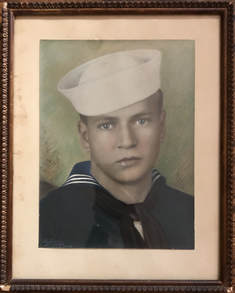Mother's Memento - by Patrick Blackburn

“Eugene” has been with me for so long I can’t quite remember the origins. It is a painted photo, dated 1948. His sad eyes were almost more than I could stand, so he had to be rescued.
His story is channeled through the gifted Patrick Blackburn ([email protected]). Pat has countless talents and interests – fortunately for me (and Eugene), writing is one of them. He also does a beautiful job of honoring the military history of this era.
"When I was born in 1928 my big brother was already 6 years old. He was to keep that meager distance ahead of me for 16 years, until October 20, 1944 when his destroyer, the Charrette, played her part in the battle for Leyte Gulf and suffered a strafing attack from Japanese aircraft that resulted in his death. I was told by my stepfather that my brother was cut down while dragging a fellow injured sailor to safety, amidships. In life he was troublemaker without direction, but in death he had become our family hero. In truth, through all our years together, he had always been my hero.
The funeral was soaked in the Navy’s darkly-hued pomp and the silent tears from my mother and younger sister. Few words were spoken between us, as there were funerals like this almost every other day in our hometown. We had already watched many of Urbana’s youth lowered into the ground in their full military dress. Many families had lost sons in this fight – now we were joining the ranks of the patriotic fatalities, grieving along with our neighbors and schoolmates.
I was possessed by anger and pride when I walked to the recruiting office the following Monday morning. I had focused all the energy of the war effort into my own chest, almost as if I could feel the bombs and shells reverberate in my heart with every footstep. My brow was wrinkled from the task I now undertook, the mission to avenge my older brother and to win the war single-handedly. My palms were cold and damp as I forged my date of birth and signed the form requesting enlistment in the US Navy. The scrawl read Eugene Winston, born January 12, 1927.
The recruitment officer was pleased when I explained that my brother had served in the Navy and I was intending to follow in his footsteps. The officer explained that he knew about my brother, and had even attended the funeral. He may have known that I lied about my age, but I am convinced that my confidence in these simple actions kept him from raising even the slightest protest.
Brother’s departure for the war was met with celebration, while my decision was met with silence and disapproval. My stepfather needed help working in the yards, and with the shortage of young men available for labor had become very short-tempered with me regarding my decision. Mother just cried. And when the train pulled away to take me off to training and seemingly inevitable battle, she just stood on the platform and never even waved “goodbye”.
I spent 8 weeks in training at the Bainbridge Recruit Training Center, learning how to clean the head in almost any kind of seafaring vessel and feed ammunition into a 3”/50 caliber AA turret. I had hoped to fly one of the Navy’s fast and fierce warplanes. I wanted to get into the business of battle urgently and the fantasy of flying just over the breaking waves in a Dauntless or a Corsair seemed like the fastest route to Japan, but those were jobs that suited recruits with a more
privileged upbringing. I was never selected to become a Navy flier. Instead I was given the job of loading 500 lb bombs into the bellies of Marauders and Mitchells. The closest I ever got to flying them was climbing into the bomb bays and inspecting release tags for the weapons load.
I spent the last few months of the war on the small islands of Ryukyu near Okinawa, feeding iron bombs into B-25G’s and writing letters home. The war in the Philippines had taken my shipmates lives’, one by one. Some were killed on the makeshift air fields by snipers hidden in the jungle. Others were lost when our carrier group was attacked by kamikaze fighters. They perished in the firestorms below deck as burning fuel spilled past elevators and into the hangars, igniting ammunition stores. When the war was over I was ordered to remain in Japan as a part of the occupation forces, attached to our carrier group. My war-worn skills were replaced by tedious paperwork punctuated with occasional relief duty as a flight deck crew chief. We were rebuilding the country from the outside, in.
In 1948 my second tour was up, and I was scheduled to return to the states. My naval career had concluded, though most of it had been spent on dry land. I was disappointed that I never fired a weapon at the enemy we faced; indeed I had never even seen a single enemy combatant in melee. I paid a local photographer to take my portrait when I arrived in San Diego, had it tinted and mailed it home to my mother’s house in Ohio to precede my homecoming."